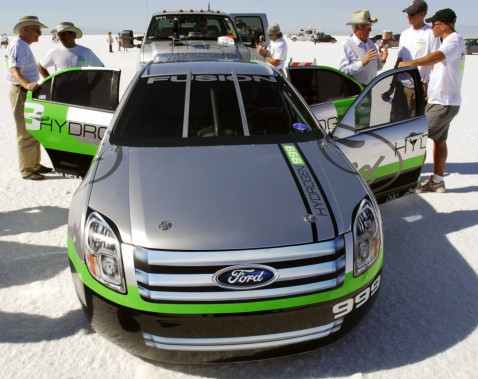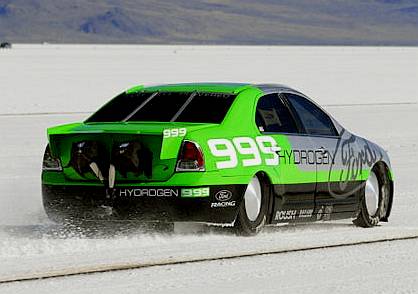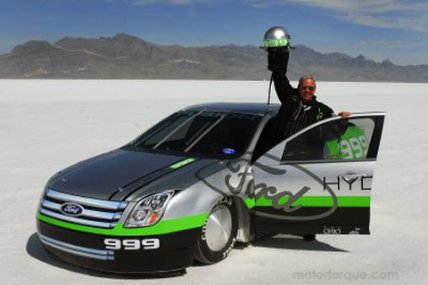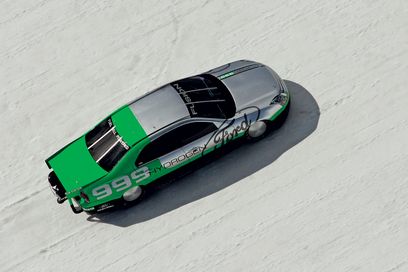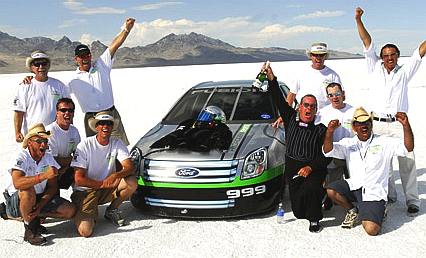|
FORD FUSION - HYDROGEN 999 CAR - 2007
AUTOMOTIVE A TO Z CLIMATE CHANGE A TO Z CONTACTS EVENTS FUEL CELLS GROWTH A-Z HYDROGEN PLEASE USE OUR SITE INDEX TO NAVIGATE THIS SITE
|
|
Racing Improves the Breed
Ford set a land-speed record for production based fuel cell cars last week when the automaker pushed its Fusion Hydrogen 999 past 207 miles-per-hour on the Bonneville Salt Flats in Utah. As a collaboration among Ohio State University, Roush, Ballard Power Systems and Ford, the car represents yet another example of alternative fuel high performance.
The Ford Fusion Hydrogen 999 LSR car
You might think that the “999” designation refers to power output of some sort, but instead the numbers hark back to the original 999 racer that set a land speed record in 1903 of 91.32 mph. Ford has always been in the business of racing, and is now demonstrating the go-fast capabilities of non-petroleum fuel sources. Ford explains how the technology works:
The Ford Fusion Hydrogen 999 demonstrates Ford's commitment to developing innovative and exciting zero emission products while bolstering our proud racing heritage. The Fusion Hydrogen 999 is powered by a one-of-a-kind Ford-designed 350 kW fuel cell system, comprised of 16 Ballard Mk902 fuel cell rows. The DC fuel cell current is fed to an inverter, which converts the current to AC, and powers the 770 hp induction motor. Unlike traditional fuel cell vehicles where only compressed hydrogen gas is stored onboard the vehicle, the Ford Fusion Hydrogen 999 also stores compressed Heliox (40% Oxygen & 60% Heliox) onboard in certified oxygen storage tanks. The use of enriched oxygen onboard the vehicle allows the fuel cells to generate more power than using ambient air and also eliminates the need for the traditional air compressor. Ford fuel cell engineers and aerodynamics specialists worked together to decrease the Fusion drag coefficient from 0.34 to 0.21, significantly improving the vehicle's ability to reach the goal of 200 mph. Moving forward, the lessons learned during the development of the Ford Fusion Hydrogen 999 will feed future fuel cell vehicle development at Ford with a goal of reducing vehicle complexity and cost, while making the designs more efficient. (Ford Fusion Hydrogen 999 brochure)
A quick look at the specifications table reveals the impressive power and drag coefficient numbers, but the curb weight of 6,700 pounds reminds us that hydrogen fuel cell technology certainly packs on the pounds. A six-speed manual transmission was sourced from the supercharged Ford GT, and Wilwood disc brakes are supported by two parachutes. Ford also used the rear-engine transaxle of the GT to put power to the salt.
Ford Fusion running at Bonneville Salt Flats 2007
Bonneville Speed Week - 21 August 2007
The
green, silver and black car, dubbed the Fusion Hydrogen
"999" after company founder Henry Ford's record-setting
1902 racecar, would have set a record at any speed. It was the
first production-based hydrogen fuel-cell racecar ever to attempt
the feat.
After a year of construction and ten years of research, the fuel-cell powered Ford Fusion 999 has scorched across the Salt Flats of Utah at the Bonneville Speed Week, clocking an incredible 207.297 miles per hour and giving Ford the mantle of the world's first automaker to set a land speed record for a production-based fuel cell powered car. Powered entirely by hydrogen fuel cells, the collaboration with Ballard, Roush and Ohio State University represents another significant step toward commercially viable hydrogen fuel cell vehicles.
Ford Fusion - Hydrogen 999 electric record car 207 mph
The Fusion Hydrogen 999 is one of two vehicles Ford's fuel cell research team is helping prepare to set world land speed records. The second vehicle, dubbed "Buckeye Bullet 2", is being developed in conjunction with Ohio State University student engineers. This streamliner-type fuel cell-powered racer aims to reach 300+ mph. Incidentally the first Buckeye Bullet set the unlimited land speed record for an electric vehicle by hitting 315 mph back in 2004. Its 770hp engine was used by Ford engineers as the basis for the 999 with Ballard Power Systems supplying the 400 kW hydrogen fuel cells.
Hydrogen fuel cells combine hydrogen, (the most common element in the universe) and oxygen to generate energy. Importantly, the only by-product of such a union is H2O, which makes it very attractive to those looking for a greener source of power. The Ford Fusion 999 project aims to showcase the potential of hydrogen fuel cells to be just as effective, and efficient, as traditional combustion engines. "Our goal is to make sure that whatever we're building within our research labs is a high-quality and efficient alternative fuel vehicle so that we can have fuel cell vehicles that the average person could be driving in the relatively near future", said Matt Zuehlk, lead engineer of the Fusion project.
But the Ford Fusion isn't just fighting the good fight on the environment front -- it's fighting it with style. The Fusion was built to be a racing monster, with an aerodynamic body housing the powerful engine. "The 999 is much lower to the ground. There are no mirrors on the vehicle, and the traditional grille in the front that lets air into the radiator is not there because we don't have a radiator onboard," comments Zuehlk. "We have a different charter with this vehicle and that is to be fast, to be stable at high speeds and to have fun achieving a lofty goal for Ford Motor Company."
Fast and clean - Hydrogen 999 electric World Record Holder 2007
The hydrogen powered Fusion is part of Ford's alternate energy initiative, which includes a flexible array of options such as hybrids, E85 ethanol, clean diesels, bio-diesels, and advanced engine and transmission technologies. The company already has a fleet of 30 hydrogen powered Focus fuel cell vehicles on the road as part of a worldwide, seven-city program to conduct real world testing of fuel cell technology. The 30-car fleet has accumulated more than 540,000 miles since its inception in 2005. Hybrid models of the Ford Fusion will be available in 2008.
By achieving a speed of 207.297 miles per hour on Wednesday at
the Bonneville Salt Flats in Utah, the Ford fuel cell team also
joined the 200 MPH Club of Bonneville Speed Week. "What we've accomplished is nothing short of an industry first," commented Matt Zuehlk, the project's lead engineer. "No other automaker in the world has come close."
Hydrogen 999 - Ford team
SMART-CHARGER - This graceful electric car concept (inspired by Reid Railton is potentially the world's fastest vehicle to be powered by hydrogen energy cartridges. This streamliner is theoretically capable of 400mph using the latest production electric motors, but is designed to beat 208mph at Pendine Sands in the United Kingdom, to beat the Ford Fusion 999 record, and then 350mph at the Bonneville Salt Flats in the USA, to beat the Buckeye Bullet 2 record of 303mpm. Featuring built in energy cartridge swapping system, charged using renewable solar energy. A unique PR opportunity in celebration of the EU banning petrol and diesel cars in Europe and the UK from 2030.
|
|
The
content of this website is copyright © and design copyright 1991 and
2020 Electrick Publications. All rights reserved. The bird
|
